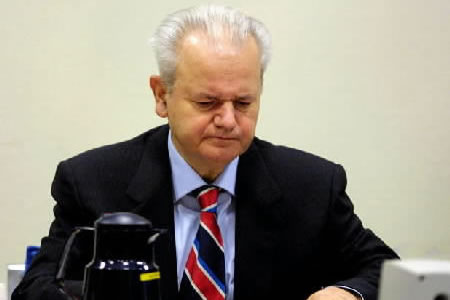Home
SCOPE OF MILOSEVIC'S RESPONSIBILITY TO BE DETERMINED BY DATES
In addition to the opinion that Milosevic did not "act with a genocidal intent", the amici curiae motion puts before the judges important legal issues that the Tribunal has not been called upon to adjudicate so far
 Slobodan Milosevic in the courtroom
Slobodan Milosevic in the courtroom At the end of the prosecution case at every trial before the Tribunal, the defence routinely files a ‘no case to answer’ motion, in which as a rule they claim that the prosecution has failed to prove beyond reasonable doubt the responsibility of the accused and asks the Trial Chamber to acquit the accused on all or some of the counts of the indictment. No trial chamber has accepted such a defence motion in its entirety. The best thing that could happen was for some of the charges that in the opinion of the trial chamber had not been proven sufficiently were dropped and the trial continued with the defence case.
In Slobodan Milosevic's case, the amici curiae have taken on the role of his defence counsel, at the behest of the Trial Chamber. Late last week they filed a motion analysing the prosecution case and moving that some of the charges that in their view have not been proven sufficiently be dropped.
The issue that has caught the public eye is the view of the amici curiae that the prosecution has failed to present evidence on the specific "genocidal intent" of the accused, and the consequent motion to drop counts 1 and 2 from the Bosnia and Herzegovina indictment – counts where Milosevic is charged with genocide and complicity in genocide. Without going into a discussion whether there was genocide in Bosnia or not, the amici curiae merely state that at this stage of the proceedings it has not been proven that Milosevic acted with the intent to "destroy [an ethnic or religious group] as such in whole or in part", and that must be done in order for someone to be convicted of the crime.
In addition to bringing into question the charges of genocide or complicity in genocide, the amici curiae motion addresses two other interesting legal issues that the Tribunal in The Hague has not dealt with yet.
The first is related to the date when the conflict in Croatia became an "international armed conflict". The date is relevant because it determines whether some of the crimes alleged in the indictment can be charged as grave breaches of the Geneva Conventions which apply only to international armed conflicts.
According to the prosecution, Croatia achieved statehood and the conflict became international on 8 October 1991, when the three-month suspension (to which Slovenia and Croatia agreed at the initiative of the European Community on 8 July 1991) of the declaration of independence expired.
The view of the amici curiae is, however, that the conflict became international "some time between 15 January (when the EC recognized Croatia) and 22 May 1992 (when Croatia became a member of the UN)."
Should the judges accept the arguments of the amici curiae, a dozen counts would be deleted from the indictment – the ones in which willful killing, unlawful detention, torture, causing grave suffering, deportation and wanton destruction of property are qualified as grave breaches of the Geneva Conventions. This would not substantially diminish Milosevic's responsibility, as all the acts have been charged in the alternative (as is common practice of the Office of the Prosecutor) as crimes against humanity or violations of laws and customs of war.
The other important issue is related to Kosovo and once again it is a question of a date: When did the state of "armed conflict" begin on Kosovo? That is an essential prerequisite for the determination whether the Tribunal has jurisdiction in the case or not.
The Kosovo indictment covers the period between 1 January and 20 June 1999. The amici curiae deem, however, that the armed conflict – an international armed conflict – began only on 24 March 1999, when NATO launched its air strikes. The events in Kosovo before that date, the motion claims, cannot be described as a "prolonged armed conflict" but rather as "banditry, disorganized and short-lived rebellion or terrorism.”
If the judges accept this argument of the amici curiae, the mass killing in Racak (15 January) and the burning of the village of Kotlina (8 March 1999) would be dropped from the indictment.
The prosecution has two weeks to respond to the legal and factual issues raised by the amici curiae motion.
Linked Reports
- Case : Milosevic Slobodan - "Kosovo, Croatia and Bosnia"
- 2004-03-05 1.5 MILLION DOLLARS FOR "EXCULPATORY EVIDENCE" IN THE MILOSEVIC CASE
- 2004-03-04 "SELF-DEFENCE" IS NOT A VIABLE OPTION FOR THE CRIMES IN BOSNIA AND HERZEGOVINA
- 2004-03-02 MILOSEVIC AND SELF-DEFENCE
- 2004-03-25 MILOŠEVIĆ REFUSES TO GIVE HIS CONSENT TO THE REPLACEMENT JUDGE
- 2004-04-14 LORD BONOMY TO REPLACE JUDGE MAY
- 2004-04-15 BATTLE FOR TIME AND WITNESSES
